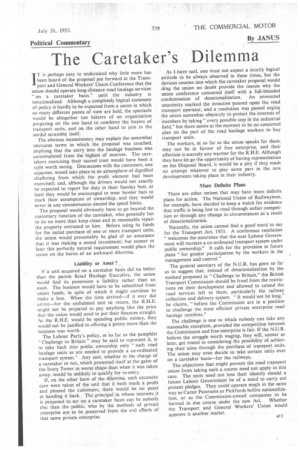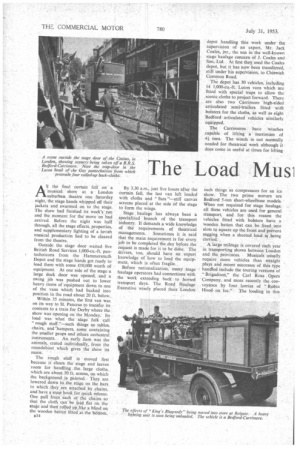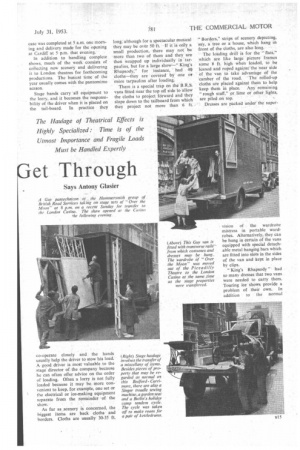The Caretaker's Dilemma
Page 47

Page 48

Page 49

If you've noticed an error in this article please click here to report it so we can fix it.
IT is perhaps easy to understand why little more has been heard of the proposal put forward at the Transport and General Workers' Union Conference that the union should operate long-distance road haulage services "on a caretaker basis" until the industry is renationalized. Although a completely logical statement of policy is hardly to be expected from a union in which so many different points of view are held, the spectacle would be altogether too bizarre of an organization preparing on the one hand to condemn the buyers of transport units, and on the other hand to join in the sordid scramble itself.
The obvious inconsistency may explain the somewhat unctuous terms in which the proposal was couched, implying that the entry into the haulage business was contemplated from the highest of motives. The caretakers exercising their sacred trust would have been a sight worth seeing. Discussions with the customers, one supposes, would take place in an atmosphere of dignified chaffering from which the profit element had been exorcised; and, although the drivers would not exactly be expected to report for duty in their Sunday best, at least they would be encouraged to wear bowler hats to mark their assumption of ownership, and they would never in any circumstances exceed the speed limits.
The proposal would obviously have to go beyond the customary function of the caretaker, who generally has to do no more than keep clean and in reasonable repair the property entrusted to him. Before using its funds for the initial purchase of one or more transport units, the union would presumably be glad of an assurance that it was making a sound investment; but sooner or later this perfectly natural requirement would place the union on the horns of an awkward dilemma.
Liability or Asset If a unit acquired on a caretaker basis did no better than the parent Road Haulage Executive, the union would find its possession a liability rather than an asset. The business would have to be subsidized from union funds, in spite of which it might continue to make a loss. When the time arrived—if it ever did arrive—for the embalmed unit to return, the R.H.E. might not be prepared to pay anything like the price that the union would need to put their finances straight. As the R.H.E. would be spending public money, they would not be justified in offering a penny more than the business was Worth.
The Labour Party's policy, in so far as the pamphlet Challenge to Britain " may be said to represent it, is to take back into public ownership only "such road haulage units as are needed to provide a co-ordinated transport system." Any unit, whether in the charge of a caretaker or not, which presented itself at the gates of the Ivory Tower in worse shape than when it was taken away, would be unlikely to qualify for re-entry.
If, on the other horn of the dilemma, such excessive care were taken of the unit that it both made a profit and pleased the customers, there would be no point in handing it back. The principal in whose interests it is proposed to act on a caretaker basis can be nobody else than the public, who by the methods of private enterprise are to be preserved from the evil effects of that same private enterprise.
As 1.have said, one must not expect a strictly logical attitude to be always observed in these times, but the devious courses into which the caretaker proposal would drag the union no doubt provide the reason why the union conference contented itself with a full-blooded condemnation of denationalization. An unwonted unanimity marked the invective poured upon the road transport operator, and a resolution was passed urging the union somewhat obscurely to protect the interests of members by taking " every possible step in the industrial field," but there seems at the moment to be no concerted plan on the part of the road haulage workers to buy transport units.
The workers, in so far as the union speaks for them. may not be in favour of free enterprise, and their affection is scarcely any warmer for the R.H.E. Although they have let go the opportunity of having representation on the Disposal Board, it would be a pity if they made no attempt whatever to play some part in the new developments taking place in their industry.
More Definite Plans
There are other unions that may have more definite plans for action. The National Union of Railwaymen, for example, have decided to keep a watch for evidence that traffic is being lost to road through unfair competition or through any change in circumstances as'a result of denationalization.
Naturally, the union cannot find a good word to say for the Transport Act, 1953. A conference resolution "welcomes the assurance that the next Labour Government will recreate a co-ordinated transport system under public ownership." It calls for the provision in future plans "for greater participation by the workers in the management and control."
The general secretary of the N.U.R. has gone so far as to suggest that, instead of denationalization by the method proposed in "Challenge to Britain," the British Transport Commission should be freed from the restrictions on their development and allowed to extend the road services left to them, particularly the railway collection and delivery system. "It would not be long," he claims, "before the Commission are in a position to challenge the most efficient private enterprise road haulage combine."
The challenge is one to which nobody can take any reasonable exception, provided the competition between the Commission and free enterprise is fair. If the N.U.R. believe the struggle worth waging, they will, sooner or later, get round to considering the possibility of ,achieving their aims through the purchase of transport units. The union may even decide to take certain units over on a caretaker basis—for the railways.
The objections that might prevent the road transport union from taking such a course need not apply in this case. The units need not lose their identity should a future Labour Government be of a mind to carry out present pledges. They could operate Much in the same way as Carter Patersons or Pickfords before nationalization, or as the Commission-owned companies to be formed in due course under the new Act. Whether the Transport and General Workers' Union would
approve is another, matter. al 3 depot handling this work under the supervision of an expert, Mr. Jack Coales, jnr., the son in the well-known stage haulage concern of J. Coales and Son, Ltd. At first they used the Coates depot, but it has now been transferred, still under his supervision, to Chiswick Common Road.
The depot has 30 vehicles, including 14 1,000-cu,-ft. Luton vans which are fitted with special traps to allow the scenic cloths to project forward. There arc also two Carrimore high-sided articulated semi-trailers fitted with bolsters for the cloths, as well as eight Bedford articulated vehicles similarly equipped.
The Carrimores have winches capable of lifting a maximum of 41 tons. The winch is not normally needed for theatrical work although it does come in useful at times for lifting
case was completed at 5 a.m, one morning and delivery made for the opening at Cardiff at 5 p.m. that evening.
In addition to handling complete shows, much of the work consists of collecting new scenery and delivering it to London theatres for forthcoming productions. The busiest time of the year usually comes with the pantomime season.
Stage hands carry all equipment to the lorry, and it becomes the responsibility of the driver when it is placed on the tail-board. in practice they
long; although for a spectacular musical they may be over 50 ft. • If it is only a small production, there may not be more than two of them and they are then wrapped up individually in tarpaulins, but for a large show—" King's RhOsody," for instance, had 40 cloths—they are• covered by one atmore tarpaulins after loading.
There is a special trap on the B.R.S. vans fitted near the top off side to allow the cloths to project forward and they slope down to the tailboard from which they project not more than 6 ft. " Borders," strips of scenery depicting, say, a tree or a house, which hang in front of the cloths, are also long.
The loading drill is for the " flats," which are like large picture frames some 8 ft. high• when loaded, to be leaned and roped against the near side of the van to take advantage of the camber of the road. The rolled-up cloths are placed against them to help keep them in place. Any remaining "rough stuff." or lime or other lights, are piled on top. "
Dresses are packed under the super




















































































